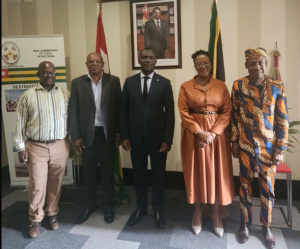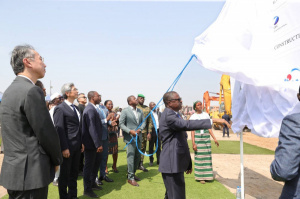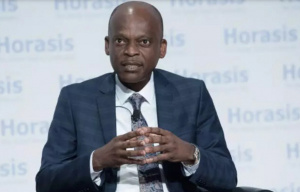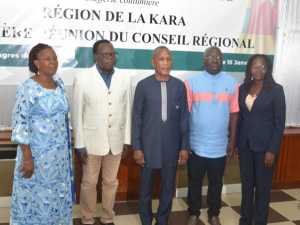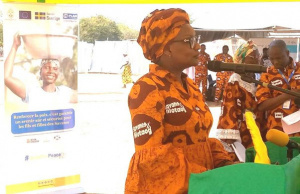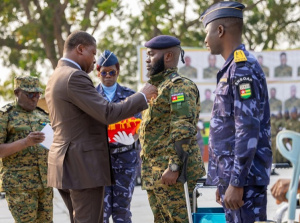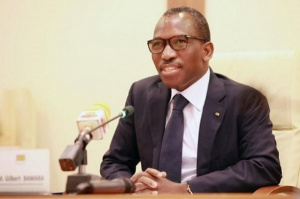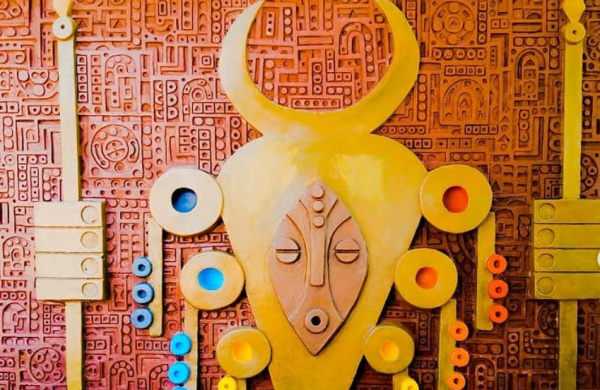Togo First
Togo Explores Railway Projects with South African Investors
Togo is looking to improve its railway connections with South African partners. On January 16, 2025, a meeting was held at the Togo High Commission in Pretoria. The Togolese delegation was led by John D. Fintakpa Lamega, Minister-Counsellor, and Chargé d'Affaires.
The meeting included people from Mathupha Capital, an investment company focused on infrastructure, and Invest SA, an agency that promotes investment. They discussed Togolese railway projects and how they could fit into the West African logistics network. At the end of the meeting, a joint working group was created to explore funding and implementation options.
These discussions are important for Togo as it aims to improve infrastructure for better regional integration and economic growth. The country has been working to diversify its partnerships, focusing on the railway sector, which has not yet reached its full potential.
Several promising projects are planned but have not yet started, such as a railroad connecting the Port Autonome de Lomé (PAL) to Togo's northern border and a rail loop linking countries in the West African Economic and Monetary Union (WAEMU).
Ayi Renaud Dossavi
Togo: Faure Gnassingbé Launches Sokodé Bypass Project
The Sokodé bypass project was kicked off on January 16, 2025. President Gnassingbé attended the launching ceremony.
The project has a budget of CFA24.5 billion, with 82% of the funding, or CFA16 billion, coming from the Japan International Cooperation Agency (JICA). The bypass will include a 16-kilometer asphalt road, divided into two parts: Tchalo-Kpario (12.7 kilometers) and Kpario-Kidèoudè (3.3 kilometers).
Other projects besides the bypass include rehabilitation works on National Road 14, which connects Sokodé to the Benin border, upgrades to National Road 17 (Sokodé-Bassar), and improvements to National Road 1 (Aouda-Alléhéridè).
The Sokodé bypass aims to reduce traffic on National Road 17 and cut congestion in the town center. This new road will also help boost trade and economic growth in the area.
Esaïe Edoh
Togo May Join AES Block, Foreign Minister Says
Togo might join the Alliance of Sahel States (AES), which includes Burkina Faso, Niger, and Mali. Robert Dussey, the Togolese Foreign, recently mentioned the possibility in an interview with Voxafrica. The move, he said, should be approved by the Parliament and the President. "It's not impossible," Dussey noted. "It's not impossible," he said"If Parliament and the President agree, why wouldn't Togo?"
Dussey emphasized that Togo wants to keep talking with all parties and focus on its interests. "Today, African peoples everywhere want to be themselves, whether in Togo, Benin, Côte d'Ivoire, Guinea, Cameroon, or South Africa. We are not against anyone... The problem is that some of our partners want us to be at their service, so we say 'NO,'" he explained.
In 2024, Burkina Faso, Mali, and Niger exited the ECOWAS block, amidst political tensions. Since then, Togo has been mediating between the two sides. By August 2024, trade with AES countries represented 74% of Togo's total trade, up from 64% five years ago.
Ayi Renaud Dossavi
Togo: Regional Councils Begin New Term
The regional councils of Togo started their term on January 15, 2025, with their first meetings across the country. Council officers were elected during the meetings.
The sessions took place in the regional capitals and were led by the governors. A designated group supervised the voting, counting, and announcement of results in each region.
In all regions, the councils will be mainly run by representatives from the ruling Union pour la République (UNIR) party. This reflects their success in the regional elections on April 29, 2024, where they won 137 out of 179 seats.
The formation of these councils marks the official start of the councilors' term and begins a new phase in Togo's decentralization efforts that have been ongoing for several years. Elected for a six-year term, councilors will work on regional development to improve local governance.
Before the regional councils’ establishment, governorates and communes were created in 2024 and 2019, respectively. This new phase will help Togo strengthen its decentralization policies.
Esaïe Edoh
Meningitis: Togo Implements Measures to Contain Outbreak
New cases of meningitis have been confirmed in the Kara region, northern Togo. On January 15, the Minister of Health, Tchim Darré, revealed the disease, which had already been spotted in the Savanes region, had spread to Kara.
Health authorities are taking steps to detect new cases early and ensure patients receive proper care. These include mobilizing health facilities to treat patients and running awareness campaigns to inform the public about symptoms and the importance of seeking medical help quickly.
The Ministry of Health is investigating affected communities to identify new cases and act swiftly to prevent further spread. A potentially fatal infection, Meningitis spreads through contact with respiratory droplets or saliva from an infected person. Symptoms include sudden fever, severe headaches, vomiting, stiff neck, and in severe cases, loss of consciousness or seizures.
Togo is part of the African meningitis belt and often experiences meningitis outbreaks. The current outbreak is caused by the Streptococcus pneumoniae which is unusual for Togo. The World Health Organization (WHO) has rated the risk level as high nationally, moderate regionally, and low globally.
To combat this outbreak, WHO recommends improving vaccination coverage and enhancing surveillance for early case detection. However, the global organization recommended no travel or trade restrictions, for now.
Togo Allocates CFA19 Billion for Food Security in 2025
In line with its 2025 Finance Law, the Togolese government plans to allocate CFA19 billion for food security and resilience this year. In 2024, Lomé had set aside CFA13 billion for the same purpose.
Antoine Gbégbéni, Minister of Agriculture, said part of the funds would help fight hunger, enhance food security, improve nutrition, and promote sustainable farming practices. The budget will support a seven-year food security plan from 2024 to 2030–a plan approved in July 2023.
Another part of the funds will help transform food systems in line with the government's roadmap for 2020-2025. The National Food Security Agency (ANSAT) will be a key beneficiary, focusing on grain purchasing and storage, and pre-financing for farmers to manage strategic reserves and stabilize their incomes.
Lomé has been encouraging farmers to produce more to meet national demands and reduce reliance on imports. President Faure Gnassingbé emphasized this during the closing of the Agricultural Producers Forum in January 2023, stating: “We must feed ourselves, make a living from our agricultural activities, provide for our own needs and those of our families to better invest in the economic development of the country.”
The new budget announced for food security and resilience makes up 34% of the Ministry of Agriculture’s 2025 budget, standing at CFA56 billion.
Esaïe Edoh
Togo: Over 7,000 Young People Receive Entrepreneurship Training via "Savanes Motaog" Program
Over the past four years, 7,232 youths, including 5,732 women, received entrepreneurship training through the “Savanes Motaog” program in Togo. The program was initiated in 2020, by Plan International Togo and its partners.
The training helped many participants start or improve their sustainable businesses through internships, material support, and funding for business plans. The project also created 1,018 savings groups, against 350 initially projected. The participants saved over CFA1.4 billion as a result.
The results were shared at a workshop in Korbongou attended by Minister Saad Mohamed Ouro-Sama, who praised the project's positive impact on local communities. Awa Faly Ba, the representative for Plan International Togo, emphasized how important this project is given the challenges in the Sahel region.
Overall, “Savanes Motaog” has reached 50,902 people, including 37,858 women and 273 individuals with disabilities. It has improved social cohesion and community dialogue. A major success is that more women are now involved in discussions about land rights and allocation.
A total of CFA1.76 billion was spent on the project. The European Union and Plan International Sweden were the financial backers, providing respectively 90% and 10% of the sum.
Ayi Renaud Dossavi
Togo Honors Military Heroes of Operation Koundjoaré
On January 13, 2025, Togo held a solemn ceremony to honor the heroes of Operation Koundjoaré, presided over by President Faure Gnassingbé. This operation, initiated in 2018 to combat terrorist threats in northern Togo, has been vital in safeguarding the country's territorial integrity.
The event took place at Camp Général Gnassingbé Eyadéma and was attended by top government officials, military leaders, and the families of the fallen soldiers. It served as a poignant reminder of the sacrifices made by these brave men and women who fought to preserve Togo’s security.
During the ceremony, President Gnassingbé posthumously awarded the fallen soldiers the rank of knights of the Order of Mono, Togo's highest honor. Additionally, wounded soldiers and those who displayed exceptional bravery received Cross of Valor medals.
These tributes come amid ongoing security challenges in Togo. Since 2020, the government has allocated approximately CFA624.8 billion to bolster the Ministry of Armed Forces and modernize and strengthen military capabilities.
This article was initially published in French by Ayi Renaud Dossavi
Public Administration: Togo to Spend CFA9 Billion on Modernization Projects in 2025
Togo plans to invest CFA9 billion FCFA in modernizing its public administration in 2025, as outlined in the 2025 budget law, which totals CFA2,397 billion in revenues and expenditures.
The funds will primarily support the Public Administration Modernization and Capacity Building Project for Service Delivery (PMAPDS). This initiative aims to enhance the country's institutional capabilities to fulfill the government's goals.
The project seeks to make public services more accessible and improve their quality through digitization. The World Bank backed with the program with over CFA45 billion.
Several public services have already been digitized. By the end of this year, Lomé expects that 75% of administrative procedures will have been dematerialized. The digitization initiative aims to simplify processes, increase efficiency, and bring citizens closer to government services.
This article was initially published in French by Esaïe Edoh
Togo to Host Festival Art et Mémoires from February 11-19, 2025
Togo will host the third edition of the Festival Art et Mémoires from February 11 to 19, 2025. The cultural event will be held in Aného, Agbodrafo, Kpalimé, and Lomé.
The festival's theme, "From Chains to Freedom: Memory, Heritage, and Hope," will delve into the history of slavery while showcasing local traditions and contemporary artistic expressions.
The festival will feature various activities, including traditional dances, concerts, craft workshops, and exhibitions. The event aims to foster discussions on pressing contemporary issues such as social justice, cultural identity, and the contributions of Afro-descendants to African development.
This article was initially published in French by Ayi Renaud Dossavi

